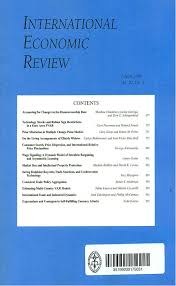
Moraga Gonzalez, J.L. and Viaene, J. (2015). Anti-dumping, Intra-industry Trade, and Quality Reversals International Economic Review, 56(3):777--803.
-
Affiliated authorsJosé Luis Moraga-González, Jean-Marie Viaene
-
Publication year2015
-
JournalInternational Economic Review
We examine an export game where two (home and foreign) firms produce vertically differentiated products. The foreign firm is more R&D efficient and is based in a larger and richer market. The unique (risk-dominant) Nash equilibrium exhibits intra-industry trade, and the foreign producer manufactures a higher-quality product. When transport costs are low, unilateral dumping by the foreign firm arises; otherwise, reciprocal dumping occurs. For some parameters, a domestic antidumping policy leads to a quality reversal in the international market whereby the home firm becomes the quality leader. This policy is desirable for the implementing country, though world welfare decreases.